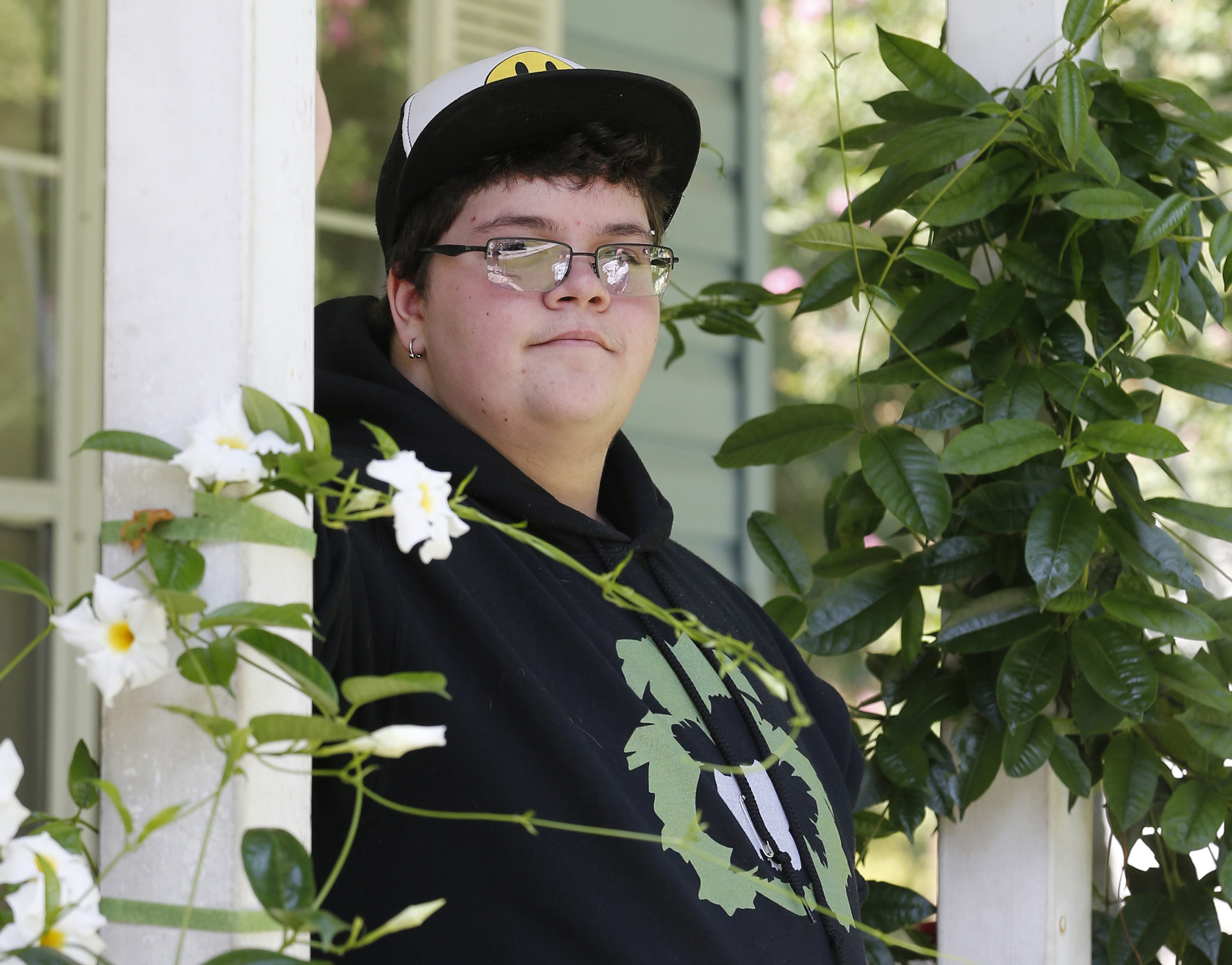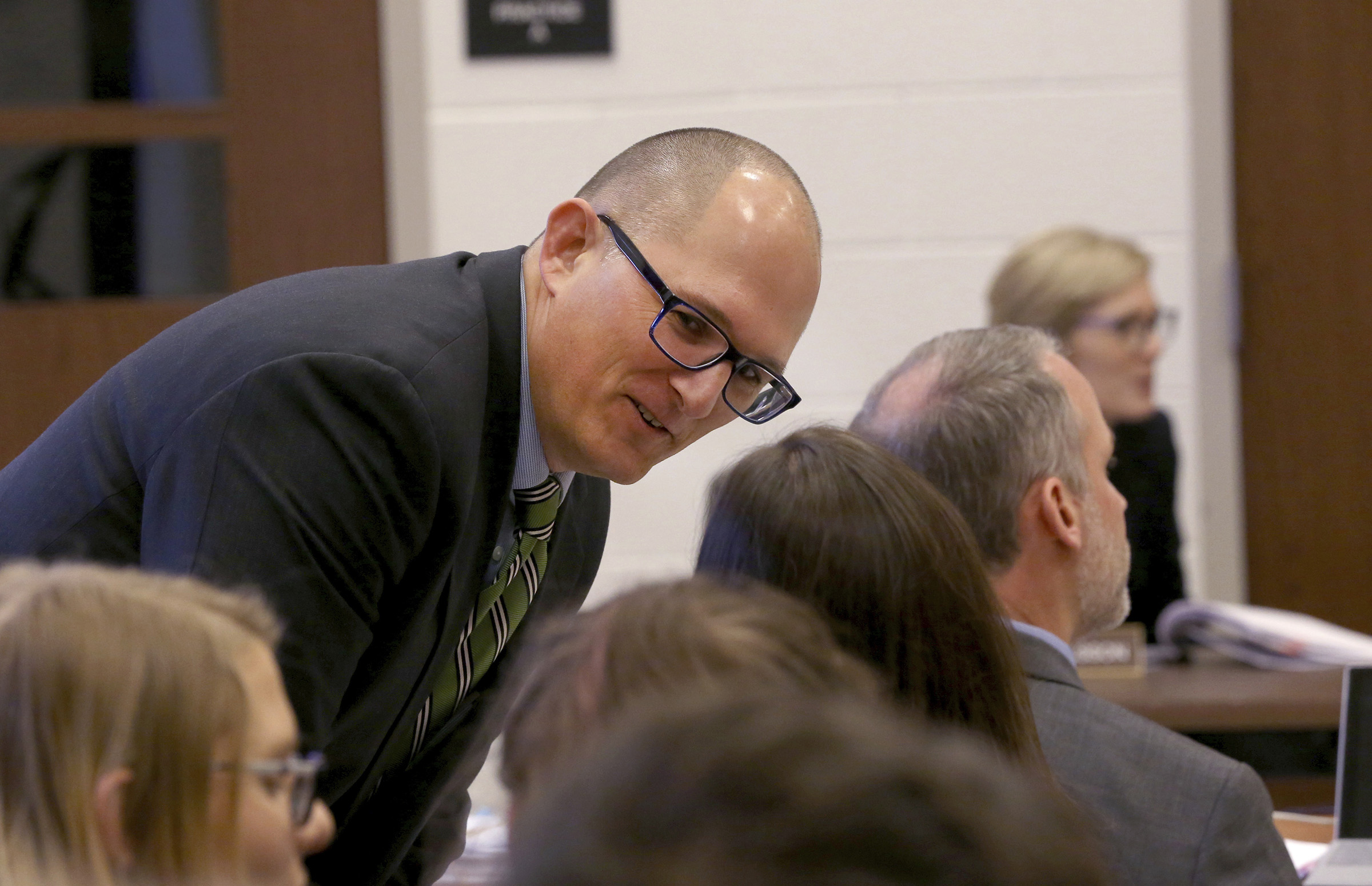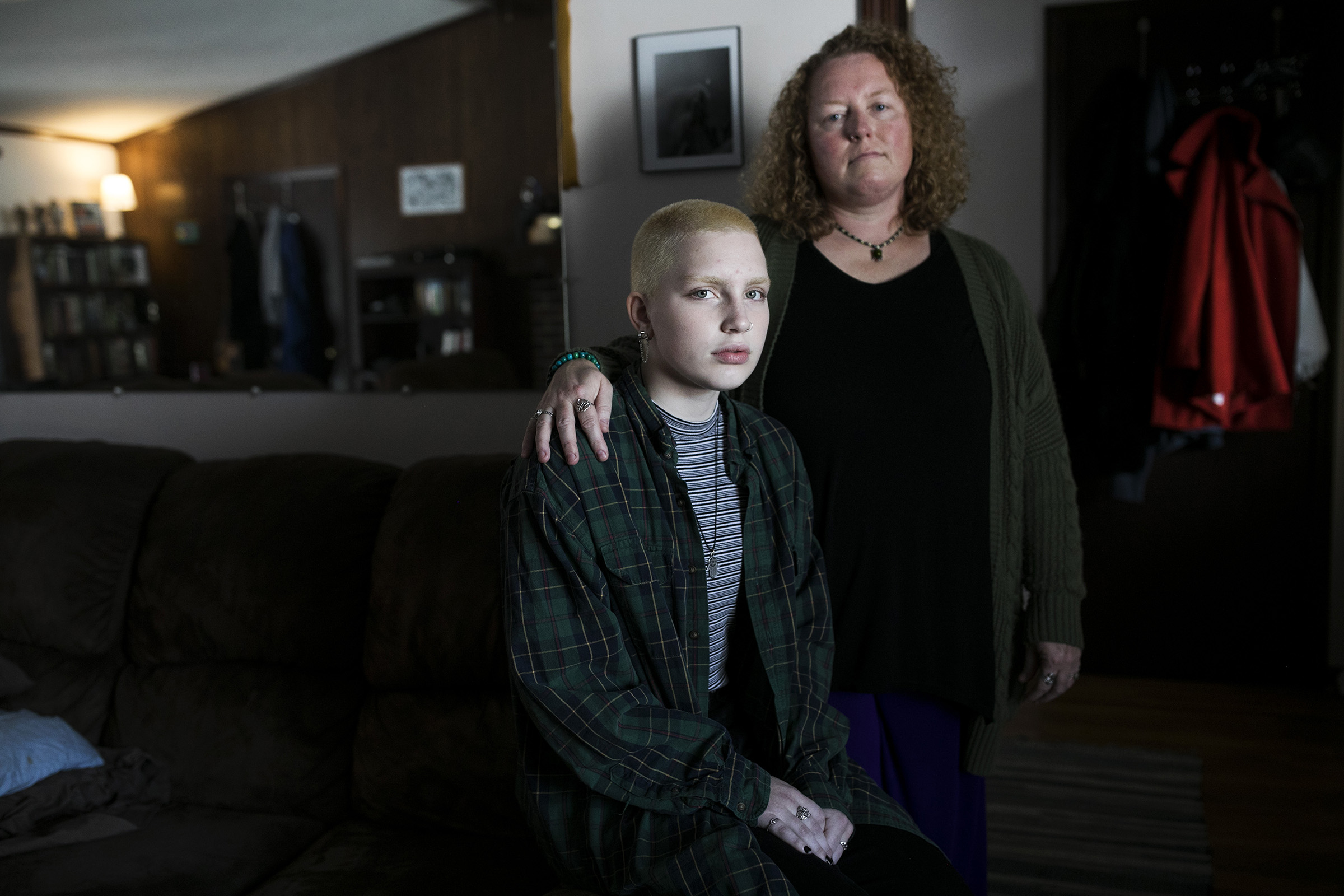
Aidyn Sucec remembers how much better he felt toward the end of eighth grade when, after years of struggling with his identity, he told his family he was transgender. It was the spring of 2017, and Aidyn’s anxiety and depression began to lift as people embraced the teenager as “him.”
“My family and friends began to recognize me as who I am,” Aidyn, who’s now 16, said in court documents.
Before Aidyn, who was designated female at birth, started at Brownsburg High School in Brownsburg, Indiana that fall, his mother, Laura Sucec, worked with school officials to make sure his new name and gender would be logged into Brownsburg’s database. She wanted to be sure teachers knew him as Aidyn and didn’t use his former name—his “dead name”—when addressing him.
The school was quick to accommodate Aidyn, and with input from Sucec and other parents, it soon allowed all trans students to use bathrooms, names and pronouns aligned with their gender identity. But that change, which was meant to protect the students, was a problem for Aidyn’s orchestra teacher, John Kluge. Kluge, 29, believes “it is sinful to promote transgender behavior,” according to a federal lawsuit he filed in June that accuses the Brownsburg Community School Corporation (BCSC) of forcing him to resign because of his beliefs. The BCSC policies do not specifically mention bathroom use or names for trans students, but Sucec and Kluge say those changes were made during the summer of 2017.
The case is one of at least three pending against public schools in three states—Indiana, Virginia, and Ohio—by teachers who say they were disciplined for refusing to use the preferred names or pronouns of transgender students. But beyond arguing over names and pronouns, the lawsuits raise the question of whose rights take precedence when transgender students’ demands for recognition and respect clash with teachers’ personal beliefs. All of the teachers say they were forced to choose between keeping their jobs or acting in a way that conflicted with their religious views.
The lawsuits come in the midst of heated national battles over LGBTQ rights, which the Trump Administration has sought to curtail. In two closely watched cases before the U.S. Supreme Court, the justices in October heard arguments about whether employers have the right to fire gay and transgender people because of their sexual orientation and gender identity, or if a federal law prohibiting sex discrimination in the workplace protects the employees. The Trump Administration has filed briefs in support of the employers in those cases. It has also sought to roll back Obama-era protections for trans students and medical patients, banned trans people from serving in the military, and supported the rights of certain businesses to refuse service to gay people due to religious objections to same-sex marriage. Such actions stand in contrast to recent public opinion polling by Gallup, which shows that most Americans believe trans people should be allowed to serve openly in the military, and that gay and lesbian people should have equal access to job opportunities and the same rights as heterosexual married couples to adopt children.

The Alliance Defending Freedom (ADF), a Christian legal group known for bringing religious-freedom cases to advance conservative causes, is providing legal support to the teachers in all three lawsuits. The ADF also defended Jack Phillips, a Colorado baker who cited his Christian beliefs in refusing to bake a wedding cake for a same-sex couple in 2012; Phillips won a partial U.S. Supreme Court victory last year when the justices ruled that Colorado’s Civil Rights Commission had shown religious bias in sanctioning Phillips.
“This isn’t just about a pronoun, it’s about what that pronoun means,” Tyson Langhofer, senior counsel for the ADF, says of the school lawsuits. “No one should be forced to contradict their core beliefs just to keep a job.”
Aidyn and his mother agree with Langhofer on one thing: that it’s not just about a pronoun. To them, it’s about much more.
“When anybody denies your child their personhood, their identity, denies them that supportive environment, they’re actively harming your child,” says Laura Sucec.
“I spent an hour a day for 180 days with Mr. Kluge, watching as he avoided me and other transgender students. Mr. Kluge’s behavior made me feel alienated, upset, and dehumanized,” Aidyn, who played the violin in Kluge’s orchestra, wrote in a legal declaration in August. “It made me dread going to orchestra class each day.”
While Kluge temporarily received a religious accommodation from the school district and started calling all students by their last names only, in an effort to avoid first names, Aidyn said other kids noticed Kluge’s refusal to acknowledge his gender. “At one point, my stand partner asked me why Mr. Kluge wouldn’t just say my name,” he wrote. “I felt forced to tell him that it was because I’m transgender.”
***
An estimated 150,000 teens, ages 13 to 17, identify as transgender in the United States—0.7%, the highest percentage of any age group—according to a 2017 study released by the Williams Institute at the University of California, Los Angeles, School of Law. As the number of trans students in K-12 schools grows, LGBTQ advocates are calling on schools to better support a population that is already more vulnerable than most kids to harassment, bullying and violence. Seventy five percent of trans students feel unsafe at school, according to a 2015 survey conducted by GLSEN, an organization that advocates for LGBTQ rights in schools. Half of the trans students surveyed said they were prevented from using names or pronouns that align with their gender identity, and 65% said they had been verbally harassed at school. A quarter of trans students said they’d been physically harassed at school, and 12% said they’d been physically assaulted.
Similarly, a survey of trans adults found that 24% said they were verbally, physically or sexually harassed in college, and 16% of those who experienced harassment said they left college because of it, according to the 2015 U.S. Transgender Survey conducted by the National Center for Transgender Equality.
There remains a patchwork of policies for trans students in school districts across the country. Some states have issued guidelines to schools, but policies differ from one district to the next.
When Sucec approached the Brownsburg district about changing Aidyn’s name and gender in the school database, for instance, she learned it had no policy for accommodating trans students, even though Aidyn was not the first. Sucec says she and other parents advised school officials as they made accommodations for trans students.
This lack of clarity has sparked several court battles, usually involving students demanding the right to use the bathroom that aligns with their gender identity.
In 2008, trans actress Nicole Maines—identified in court documents at the time as Susan Doe—sued her Maine school district when it denied her permission to use the girls’ bathroom at her elementary school. The case ended up in the state Supreme Court, which ruled in Maines’ favor in 2014. It was the first time a state had declared it unlawful for a school to deny a transgender student access to the bathroom that aligns with their gender identity, but it hasn’t stopped states from trying.

In 2017, a Pennsylvania school district settled with three transgender teens who had sued after being denied access to the bathrooms that match their identity. As part of the settlement, the school board directed all district schools to end bathroom restrictions for trans students. Last year, a federal judge in Florida ruled in favor of 17-year-old Drew Adams, who had sued his school for the right to use the boys’ bathroom. “Now I can finally be like any other kid at my school, any other boy,” Adams, who has openly identified as male since 2015, said in an interview with local news in 2018. The St. Johns County School Board has appealed the ruling to a federal appeals court. In August, a nearly five-year battle waged by Gavin Grimm of Virginia finally ended when a federal judge ruled that his school had discriminated against Grimm, a transgender male student, when it denied him access to the boys’ bathroom when he was 15.
But schools also face obstacles when they attempt to accommodate transgender students. In October, a Georgia school district that had adopted a transgender-friendly bathroom policy — in line with the ruling in Adams’ case — reversed the decision in the face of death threats, vandalism and other forms of harassment.
Though many of the most high-profile cases involving the rights of trans students have taken place at the K-12 level, tensions arise in higher education as well. There are an estimated 139,000 trans college students in the U.S., Reuters reported in August. And polling shows younger generations are more familiar with people who are transgender or nonbinary. More than a third of Gen Zers (born after 1996) say they personally know someone who uses gender-neutral pronouns, according to a Pew Research Center report published this year. The American Society of Plastic Surgeons says gender confirmation surgeries in the U.S. have nearly tripled in recent years, from 3,200 in 2016 to 9,576 in 2018. But many colleges still lack gender-neutral bathrooms and housing or non-discrimination policies that protect trans students. In August, a mental health study published in the American Journal of Preventive Medicine found that transgender, gender nonconforming and nonbinary college students are two to four times more likely to experience mental health problems than their peers. The lead author of the study, Boston University School of Public Health assistant professor Sarah Ketchen Lipson, concluded, “there has never been a more important time for colleges and universities to take action to protect and support trans, genderqueer, and nonbinary students on campus.”
But the lawsuits from Kluge and other teachers concern challenges whose solutions aren’t as simple as changing signage on bathroom doors, or switching names in a database.
LGBTQ advocates and mental health experts say the evidence is clear: transgender students do better when they’re not made to feel awkward or isolated from their classmates. “The overwhelming body of evidence about every single student in every classroom in this country is that when you treat a student with respect, when you pronounce their name correctly, when you use the right name, when you refer to them in terms that are appropriate to who they are—no matter who that student is—they do better,” says Eliza Byard, executive director of GLSEN. “They feel like they belong in their classroom, they are more likely to listen to you as an educator, and they have the simple ability to participate fully in school life.”
But attorneys on the opposite side say tolerance should be a “two-way street” and schools’ actions amount to a “heckler’s veto” of religious and free-speech rights. Many conservative Christians argue that gender is determined at birth as either male or female and “it cannot be changed,” per Kluge’s lawsuit.
“We see a growing hostility in the culture to religious liberty, and so this is another example of that. And we want to fight those examples hard with all the tools we have,” says Curt Smith, chairman of the conservative Indiana Family Institute, which is supporting Kluge’s lawsuit. “The larger goal is to have the government realize it cannot coerce speech.”
***
From an early age, Aidyn Sucec said he struggled with his identity, “knowing that there was something different about me.” He’d been treated for depression and anxiety since second grade, but it wasn’t until he turned 14 and came out as transgender that Aidyn said his mental and emotional health improved. He changed his name to Aidyn on his birth certificate and social security card, and friends and relatives accepted his new identity.
“My family and friends refer to me as Aidyn,” he said in his legal declaration. “Indeed, everybody in my life now refers to me as Aidyn.”
But that wasn’t the case in Kluge’s orchestra class.
When Kluge, who had been teaching at Brownsburg since 2014, first raised religious objections with the Brownsburg superintendent to the school’s transgender-friendly policies, his lawsuit says he was given an “ultimatum.” He could use students’ transgender names, resign or be fired. Kluge suggested he be allowed to address all students by their last names only, as an athletic coach would, and the district approved. But five months later, the lawsuit says, officials told him that the plan was creating tension in the classroom and later said some students “were offended by his use of last names.”
Kluge’s beliefs were clear to Aidyn. Throughout the year, Aidyn said Kluge refused to use his name. Instead, he said Kluge would nod or wave at him in class to get his attention, or call him by his surname. When Kluge was out one day, Aidyn said the substitute teacher referred to him in front of the entire class by his former “dead name,” something Aidyn described as “intensely humiliating and traumatizing.”
The school principal, Bret Daghe, told Kluge he had until the end of the school year, May 2018, to resign. (Daghe did not respond to a request for comment.) According to the lawsuit, Kluge submitted a “conditional” letter of resignation on April 30, 2018, then changed his mind and sent a letter on May 25 rescinding his resignation. But Kluge says that same day, the school locked him out of buildings and internet access and posted his job.
The mandate that Kluge use trans students’ names and pronouns “left Mr. Kluge with an untenable choice of maintaining his employment while violating his sincerely-held religious beliefs on an almost daily basis, or losing his employment—the chief financial means of support for his family,” his lawsuit said. At the time he lost his job, Kluge was earning a salary of $46,250, plus an additional stipend of $5,200 a year for being the school’s music director.
(The Brownsburg Community School Corporation and the individual defendants, who have asked the court to dismiss Kluge’s case, declined to comment on pending litigation.)

In Virginia, high school French teacher Peter Vlaming similarly accused the West Point School Board of violating his rights to free speech and free exercise of religion under state law, when he was fired in December 2018 for refusing to use male pronouns when referring to a trans male student. “He wasn’t fired for something he said. He was fired for what he didn’t say,” his lawsuit filed on Sept. 30 says.
According to Vlaming, he’d agreed to use the student’s preferred first name in class but refused to use male pronouns and was accused of using female pronouns in the student’s absence. In one incident, the lawsuit said, he slipped up and called out, “Don’t let her hit the wall!” during a class exercise in which he feared the student, who was wearing virtual reality goggles, could be harmed. According to the lawsuit, the trans student, who has not been publicly identified, approached him after class and said, “Mr. Vlaming, you may have your religion, but you need to respect who I am.”
West Point Public Schools said Vlaming, 47, was disciplined for violating a school district policy prohibiting discrimination on the basis of gender identity. The school board and staff “acted within the law and division policy, and we deny any liability to Mr. Vlaming” and plan to “vigorously defend against any claims,” the school district said in a statement.
Philosophy professor Nicholas Meriwether’s lawsuit filed in federal court in November 2018 also claims that his religious beliefs were violated by Shawnee State University in Portsmouth, Ohio. Meriwether—who typically uses “sir” or “ma’am” and “Mr.” or “Ms.” when addressing students in class—was investigated and had a warning placed in his personnel file after he refused to use female pronouns to address a trans female student. University officials said Meriwether’s treatment of the student created a “hostile environment” and violated the school’s nondiscrimination policy. In September, a federal magistrate judge recommended that the suit be dismissed, refuting Meriwether’s First Amendment claims. His attorneys filed an objection, and a U.S. District judge will issue a final ruling.
The university declined to comment on specifics of the case while litigation is ongoing but defended its actions. “We are confident, though, that as details about the case come to light, it will become clear that efforts were made by Shawnee State to both respect our faculty member’s deep rooted religious beliefs and our student’s right to equal treatment in the classroom,” a university spokesperson said in an email.
Langhofer, of the Alliance Defending Freedom, says Vlaming has not been able to find another teaching job since being fired, while Meriwether, 62, remains a tenured professor at Shawnee State. Kluge has also been unable to find a job in another school and is working as a contractor and teaching private music lessons instead, says Michael Cork, an attorney representing him.
***
Justin Driver, a Yale law professor and author of The Schoolhouse Gate: Public Education, the Supreme Court, and the Battle for the American Mind, says he would be surprised to see the teachers prevail in their suits because such a decision would conflict with the 2006 U.S. Supreme Court ruling in Garcetti v. Ceballos. That decision said a public official’s free speech rights are only protected when they’re acting as private citizens, not while performing official duties.

Paul Castillo, a students’ rights attorney for Lambda Legal, agrees. “It is not the public square,” Castillo says of classrooms. “And these students, particularly in a K-12 environment, are mandated to be there. They have no choice, and they ought not to be subjected to discrimination.” Castillo is representing Indiana Youth Group, an LGBTQ advocacy organization that has filed a motion to intervene as a defendant in Kluge’s lawsuit because it has an interest in the outcome and believes it can better represent the rights of trans students.
Driver expects lawsuits challenging the rights of transgender students to increase, and he thinks the Supreme Court is likely to take up the issue at some point. “The questions that divide American society often find their fiercest battles arising within the schoolhouse itself,” Driver says. “The schoolhouse is where people on both sides of the issue feel strongest, and I think that’s because what young people learn in American public schools, they carry with them for the rest of their lives.”
In a speech at Notre Dame Law School in October, U.S. Attorney General William Barr called public schools “ground zero” for “attacks on religion,” citing laws in New Jersey and California that require schools to include the social, political and economic contributions of LGBTQ people in the curriculum. Barr said “many feel” that curriculum is “inconsistent with traditional Christian teaching.”
Byard, of GLSEN, says attitudes like that are all the more reason teachers should respect the identity of trans students. Given the level of polarization in the country over issues of gender and identity, Byard says, trans students “are being used as a political football by people at the highest levels of government.” With studies showing them already at higher than average risk for depression and suicide, being caught in the middle of bitter political fights only makes things worse.
“They are in danger, and every single teacher out there is in a position to help them through the simple act of using the right name and the right pronoun every day,” Byard says. “The ability to help them is entirely within their control. It is a daily act of affirmation that could save someone’s life.”
For Aidyn, school became intolerable after Kluge’s departure turned into a controversial issue that sparked protests at a school board meeting and bullying at school. In court documents, Aidyn said several students hurled insults at him when he showed up for the start of his sophomore year in the fall of 2018. One student “called me ‘the fag that got Kluge fired,’” he said.
A week into that school year, he withdrew from Brownsburg. Laura Sucec says Aidyn is now taking online classes at home through Indiana Connections Academy, a free online public school program. He’s doing well, she says — earning good grades, preparing to graduate a year early, and feeling more relaxed. But she wishes he’d never had to endure the misery that led him to leave Brownsburg High.
“He’s going through the process of identifying who he is as a person. That’s something that everybody goes through,” says Sucec. “But when somebody identifies as being transgender, that’s much more difficult to go through, because that’s something that not everybody understands.”
More Must-Reads from TIME
- Why Trump’s Message Worked on Latino Men
- What Trump’s Win Could Mean for Housing
- The 100 Must-Read Books of 2024
- Sleep Doctors Share the 1 Tip That’s Changed Their Lives
- Column: Let’s Bring Back Romance
- What It’s Like to Have Long COVID As a Kid
- FX’s Say Nothing Is the Must-Watch Political Thriller of 2024
- Merle Bombardieri Is Helping People Make the Baby Decision
Write to Katie Reilly at Katie.Reilly@time.com